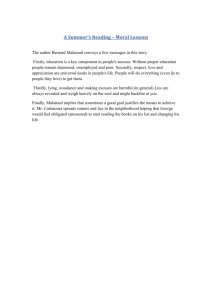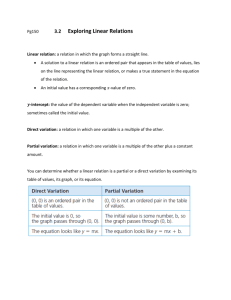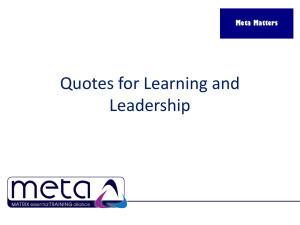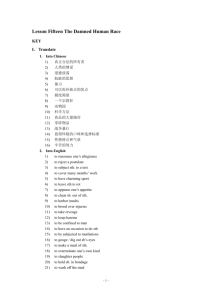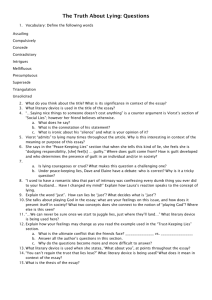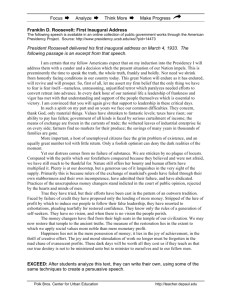lying
advertisement
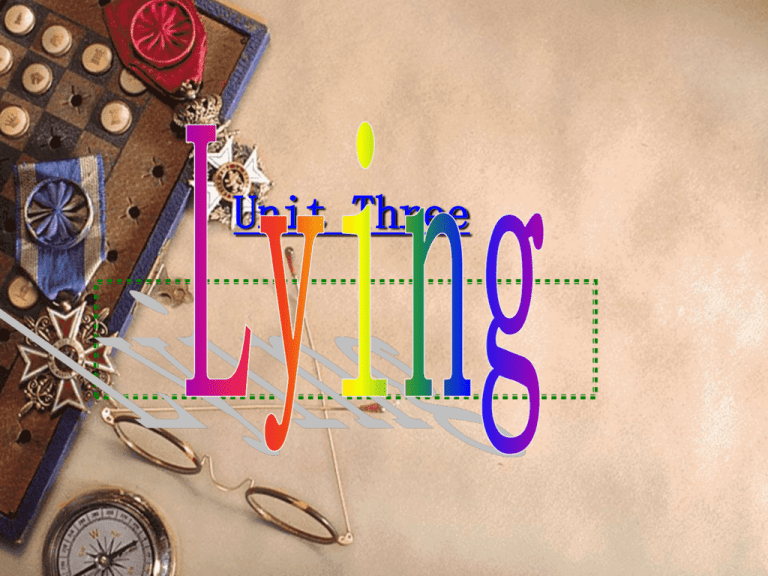
Unit Three Objectives After Studying the unit, the student should be able to: Understand the main idea and structure of the text; Master the writing skills in expository writing---how to use division, classification and definition in this category; Master the key language points and grammatical structures in the text and the exercises; Go through the exercises of reading, writing, listening and speaking . Time allotment 1st and 2nd Pre-reading: questions periods While-reading: title, preface, structure, main idea 3rd and 4th While-reading: language points, periods understanding of the text, writing techniques 5th and 6th Post-reading: guiding through Ss’ after-text periods Checking on Ss’ home reading (Text B) 7th and 8th Theme-Related Language Learning Tasks periods Fast-Reading (Unit3-A1, B1); Practical-Exercise Book (Unit3) Pre-reading tasks Questions 1. Have you ever told lies? Why/Why not? 2. What do you think of telling white lies? (called social lies in the text) 3. What are the four kinds of lies mentioned in the passage? 4. What’s the attitude of the author towards telling the lies? What’s your attitude then? While-reading tasks 1) Preface & Title: The author raises a lot of questions about lying in the prefatory paragraph and comes to the conclusion that the truth about lying is “not quite as straightforward as one might suppose”. She thinks it “very difficult” to do the writing on the subject (Line 2) and she can’t “present any ultimate conclusions” (Line 5). But why do you think the author still engages herself in the writing of the passage? While-reading tasks 2) Structure & Main idea: Part One (Para 1): Why the writer finds it difficult to write on the subject of lying and how she is going to deal with the difficulty in composing the essay. ---Beginning: a series of moral puzzles concerned with lying author’s view about the puzzles While-reading tasks 2) Structure & Main idea: Part Two (Paras 2-36): The writer discusses four types of lies and tells us what she thinks about each of them. ---Development: classification (types) definitions (four) examples (each category) examples (each category) opinion (of the author) While-reading tasks 2) Structure & Main idea: Part Three (Paras 37-42):: How the writer feels we should cope with the question of whether or not to lie. ---Conclusions: for both kinds (those with no talent for lying and those good at telling lies) the truth’s always better(L 126) view of the author While-reading tasks 3) Writing techniques: The author works with division and classification in writing while lies are arranged into the distinct categories. Quite a few examples are cited to support he classification under each category so as to encourage the reader to come to the conclusion of his own. A number of questions (some are parallel) are asked throughout the passage to capture the reader’s attention, to arouse his interest, to guide him to further reflection and to motivate him to form the judgement of his own. Examples l l l l l l l l l l Do you agree? What about you? Will you say … Will you praise…? Will you decline…? What about you? Do you, when… Do you, when… Do you, when… What about you? (Line 8) (L15) (L16~L18) (L19) (L20~L22) (L45~L46) (L47~L48) (L49~L50) (L51~L52) (P72, P92, P117, P130) Post-reading tasks 1) Guiding through students’ after-text exercises (mainly vocabulary, cloze and translation). 2) Checking through students’ home-reading of Text B (with language practice exercise P101~P102). 3) Having students preview Unit 4 (Text A) and prepare for the oral presentation “Honesty is the best policy”, do you agree? why or why not? Theme-Related Language Learning tasks Having students read the four samples (letter of apology) and grasp some guidelines for writing. Class Activity I. Judgment Give the two statements to your students and ask some of them to have a judgment on them and to give his/her reason(s) respectively. Statement One: People have to lie in some cases. Statement Two: No one is allowed to lie for any reason. II. Situation---Tactics Describe the situation he/she were in and have some students respond to it one by one. He/She were not good at English, nor were he/she fond of it. If he/she failed in an English test and he/she wouldn’t let his/her parents down yet found it guilty to lie to them, what would he/she do, say or explain when asked about the test? III. Conclusion Ask some of the students to generalize his/her conclusion from the situation above, giving his/her philosophy of life concerning truth and lies. Cultural Notes Judith Viorst (1931- ) Judith Viorst was born in Newark, New Jersey, in 1931. She is the author of several works of fiction and nonfiction, for children as well as adults. Her most recent work of nonfiction, Imperfect Control, was published by Simon and Schuster in 1998. She is also the author of Murdering Mr. Monti (1994) and Necessary Losses (1986) which appeared on The New York Times best-seller list in hardcover and paperback for almost two years. Judith Viorst lives in Washington, DC, with her husband, political writer Milton Viorst. The Author of “The Truth about Lying” Cultural Notes Watergate Hotel in Washington D.C. Watergate (水门事件) Early in the morning on June 17, 1972, police discovered five intruders inside the headquarters of the Democratic National Committee. The burglars were there, it turned out, to adjust bugging equipment they had installed during a May break-in and to photograph the Democrats' documents. The burglary and subsequent cover-up eventually led to moves to impeach President Richard Nixon. Nixon resigned the presidency on 8 August 1974. 水门事件(美国政治丑闻, 共和党总统竞选连任委员会于1972年6月17日派人潜入水门大厦民主 党总部安装窃听器, 此事暴露后导致尼克松总统辞职) Language Points Presentation by teacher 1. generalize: make general statements without reference to details e.g. This report generalizes about the sales strategies of the company in its first part. You can safely generalize the conclusion from all those facts. 2. Irritate: make angry or annoyed e.g. The professor was irritated immediately by their suspicions about his kindness to the poor children. His abrupt manner irritated nearly everyone at present. 3. straightforward: simple, expressed or understood in a direct way e.g. Why not take this topic for you term-paper? It’s really straightforward. The straightforward stories are adapted for those under 6 years old. 4. intrigue: arouse interest or curiosity of e.g. The magician did so wonderfully that the audience had been intrigued by his performance/the whole morning. The newly-released bulletin intrigued many speculators in this trade. 5. arrogant: unpleasantly self-important e.g. An arrogant man as he is, there is hardly any chance that others will get along with him. The impatient boy declared his resignation in an arrogant tone. 6. assail : cause (sb.) to experience unpleasant thoughts or feelings e.g. As soon as he put forward his opposition at the meeting, he was assailed with numerous questions by the debaters. In the novel, the hero had been assailed by fear, anxiety, pain, despair, resentment and hatred. 7. what about : what is the news or position or your opinion of e.g. What about the English test? Has it been cancelled? “What about cutting down your drinking if you couldn't stop it?” the doctor asked. 8. Proclaim : announce (esp. sth. positive) publicly or officially e.g. The military force proclaimed that they could be responsible for the bombing downtown. The government proclaimed stock exchange to be lawful and an essential part, in social economy. 9. for the most part : on the whole, mostly e.g. The vocabulary exercise is not so difficult as expected for the most part . For the most part, he learned to play the saxophone for pleasure . 10. eloquent : expressing or showing (sth.) very strongly though without words; able to make good speeches that influence the hearers e.g. The unfortunate occurrence was an eloquent proof of the ineffective management system . Because of his eloquent plea, the accused was announced guiltless by the jury . 11. indulge : allow (oneself or sb. else) to have too much of sth. enjoyable indulge in: take pleasure freely in e.g. The Kents attached great important to the cultivation of the young and never indulge any of their children or grandchildren. No one can be in the mood to learn more if he indulges in cards, games or the like . 12. go along : act in cooperation or express agreement (followed by with) e.g. Although his proposal was not turned down, none would go along with it . I’ve never thought of going along with such a ridiculous point as everyone is entitled to try anything in any way . 13. disapprove of : have or express an unfavourable opinion about e.g. The doctor disapproved of any smoking and drinking as he was out of condition at the moment. Nearly half of the Board disapproved of the plan, but nothing better has come up . 14. dodge : avoid by a trick or in some dishonest way e.g. I didn’t mean to dodge the difficulties but first demanded a logical explanation for your behavior. Children should be taught how to deal with common emergencies and to dodge unexpected blows in the pre-school stage . 15. be/get caught in : get in the middle of unexpectedly, be trapped in e.g. The rescue squad got caught in the heavy snow as they set out for the flooded area . It’s very likely that one will be caught in a thunderstorm late in the afternoon of this season. 16. be in the mood to do sth. : be inclined to do sth. e.g. Having reached his goal, he found himself , not at all, in the mood to do anything more. If you can learn to be in the right mood, you will certainly benefit a lot. 17. assert : defend or maintain (one's rights, etc.) e.g. The suspect assert his right to defend himself in court. She asserted her narrative of the happenings to be true. 18. absurd : ridiculous, stupid e.g. How can you come to such an absurd conclusion as all the lies are acceptable . The timid boy found himself absurd when he was at a loss on the platform . 19. intimacy : the state of being intimate (followed by with / between) e.g. Intimacy between the head of a department with his assistant is not desirable in most cases . What do you think of his intimacy with all his patients? 20. protective : sheltering, concerned for the safety of sb. e.g. The government has adopted some protective measures to lower the crime rate. The protective tariff on cars is to be done away with before long. 21. marital : of or relating to marriage e.g. Each applicant is required to fill out a form, giving his personal information such as name, age, educational background, working experience, marital status, etc. Marital relations tend to be affected by political, social and economic factors of the time . 22. manipulate : manage (a person, situation, etc.) to one's own advantage manipulation: the act of manipulating or condition of being manipulated e.g. No one could possibly believe the official had to resign and would be changed with market manipulation . Manipulating the finances of a company is regarded as illegal in an audit . 23. juggle : deal with (several things) at once, esp. with ingenuity; keep (several objects) in the air at the same time by throwing them up quickly and catching them again e.g. All the children were amazed to see her juggling plates and bowls . To make matters worse, he began to addict himself to gambling by juggling with cards in addition to the passion for computer games. 24. concede : acknowledge reluctantly as being true, just, or proper e.g. Many children concede that they have lied mostly for escaping punishment from adults . “Many errors in judgement are caused by irresponsibility rather than inability of the staff,” the headmaster conceded . 25. call on sb. to do sth. : request or require sb. to do sth. e.g. The public has been called on to fight against waste . The authorities called on the departments concerned to take charge of the development of the research . 26. adamant : (of a person or behavior) hard, immovable, and unyielding e.g. They have always regarded the adamant man as a true friend of integrity and fairness . She complained that she’d been given too much work and was adamant that she need two more weeks to finish it . 27. sticky : painful or difficult; adhesive e.g. It’s really dangerous driving so fast on the sticky road. Her knowledge and experience would make her get over any sticky situation . 28. contradictory : involving, causing, or constituting a contradiction e.g. During the past ten years, there have been contradictory ideas about the rights and duties of the governor . His remarks seemed contradictory so that we didn't go along . 29. give away : reveal, disc1ose; betray e.g. You shouldn't have given away the secret . The wordy style of the passage gave herself away as a native speaker. 30. be stuck with : be burdened with something and unable to get rid of it e.g. He was not interested in the program, but he got stuck with it and tried his best to complement it. 31. resort : a person or thing that one goes or turns to for help as a last resort: if all other ways fail e.g. As soon as he was told the disease was incurable, the patient resorted to Chinese traditional medicine . As he couldn't track down the reference books he needed in the library, he had to turn to his tutor as a last resort . Student Presentation Directions: You are required to look up the following words and expressions in the dictionary and give a brief presentation in the class. embarrassment embarrassed embarrassing honesty -dishonesty honest dishonest basically mutter utter grumble whisper in general romantic romance nonetheless for now illegal legal Writing Assignment Directions: For this part, you are required to write a composition of no less than 150 words on the topic “Lies and Honesty ” It should be finished no more than 30 minutes. The composition must be based on the following outline given in Chinese. 1. 有些人认为凡撒谎的人都不诚实; 2. 有些人则不以为然; 3. 我的看法。 Additional Exercises 1. The story of Ruth has intrigued readers for different reasons for so many years. A. has inspired B. has upset C. has aroused sympathy of D. has aroused interest or curiosity of 2. She was surprised and a little offended by her daughter’s passionate tone but she knew enough not to argue. A. adamant B. irritated C. arrogant D. assailed 3. Many people believe that white lies are not worth the trouble of detecting, but more stress the aggregate harm from too many marginally harmful practices. A. cumulative B. redeeming C. additional D. unexpected 4. The fact is eloquent that the recent increase in atmospheric CO2 is well documented. A. self-evident B. self-supporting C. convincing D. dependable 5. The young girl kept a diary of life during her first year of junior high school, and in it she wrote as if corresponding with an intimate though imaginary friend. A. sincere and honest B. real and faithful C. close and familiar D. kind and loyal 6. Dr. Smith wanted me to do a more intensive study, to count the cells and cell types, but I was not in the mood to do that. A. felt gloomy about doing B. didn’t feel like doing C. found it difficult to do D. didn’t think it worthwhile to do 7. She used to be indulged in reading, drawing pictures and writing little stories for hours, and she could sometimes be prevailed upon to read aloud to her parents though she dreaded their judgment . A. busy herself in … be persuaded B. lose herself in … be persuaded C. busy herself in … be encouraged D. lose herself in … be encouraged 8. It would be difficult to describe the subtle brotherhood of man established there, and easy to be caught in racial conflicts in the region, an anthropologist said. A. fall in with B. get down to C. be trapped in D. be captured by 9. It is very expensive proposition to keep teenagers amused these days, and for now they can come here free, where it is safe and warm . A. at present B. immediately C. from now on D. up to date 10. He promised not to give away a friend’s secret, I still believe there are times when he must nonetheless break his promise . A. give up B. betray C. surrender D. speak out 11. Key intelligence used to justify war in Iraq may have been wrong, US Secretary of State Colin Powell has conceded . A. said openly B. admitted frankly C. declared officially D. acknowledged reluctantly as being true 12. Teaching, for the most part, is an exhausting but rewarding profession . A. on the whole B. as a whole C. at most D. most of all 13. Most scientists now assert that the greenhouse gases trap heat into the atmosphere, which increase the earth’s surface temperature . A. assault B. allot C. provoke D. proclaim 14. He didn’t understand why he indulged in such a wild and visionary idea at that moment, yet the illusion was at last dispelled. A. was occupied with B. was engrossed in C. was obsessed by D. was depressed by 15. Some writers seem to try to present themselves as fair-minded in spite of their clear positions and straightforward language . A. plain B. distinctive C. clean D. homely 16. Paul had slept very little, and felt uncomfortable and assailed by anxiety and concern about the days to come . A. caught in B. stuck with C. intrigued by D. irritated by 17. People are taken in easily although we insist that we are aware of the manipulation of the media. A. that the media is in wise hands B. that the media is put into good use C. that the media operates effectively D. that the media is under control 18. Travel agencies say that tourists are bored with the same kind of hotel in the same kind of resort and now looking for more adventurous destinations . A. place of amusement B. place of interest C. destination D. location 19. With the rapid growth in commercialization, consumers are better informed in a wide variety of areas and will not resort to the indiscriminate use of commodities. A. unsolicited B. disapproving C. random D. misleading 20. It is a general belief that the government will take some desperate measures to rationalize the stock exchange . A. cut down on personnel B. alter C. stimulate D. moderate 21. I’m sure freshman classes will continue to captivate us older people and to infuriate us at others . A. at one time B. at a time C. at times D. some time 22. I of the argument that homelessness is exclusively a social problem, a system failure . A. distrust B. dissent C. disapprove D. disagree 23. His teachers were in despair, voicing the feeling of them all when he declared he had done something already . A. romantic B. peculiar C. absurd D. illegal 24. Although the effort are not yet strikingly in everyday life, to deal with the problem, the present generation might have to make sacrifices for the next . A. Acceptable B. noticeable C. Incorruptible D. incredulous 25. The author a frank and fearless style that made him widely admitted and widely despised . A. employed B. utilized C. manipulated D. resorted to 26. After a concert was over Paul was always and wretched until he got to sleep, and tonight he was even more than usually restless . A. shocked B. irritable C. arrogant D. adamant 27. He couldn’t find a satisfactory answer to the question——why should millions be spent daily on the war and yet there’s not a penny for medical services or for poor people? A. Applicable B. acceptable C. Available D. useful 28. It is said that shopping was once done of necessity, we go shopping for entertainment to see new things advertised in the television commercials and to mingle with people . A. because B. now that C. what’s more D. nonetheless 29. After , the government decided to put a stop to the marked slowdown of development rate by raising labour efficiency . A. weighing the pros and cons B. keeping trouble at bay C. making mountains out of molehills D. dodging responsibility 30. Modern thinkers who have studied myths and fairy tales from a philosophical or psychological viewpoint will not such an absurd idea, regardless of their original persuasion . A. take up B. give up C. back up D. set up against 31. “Reading has become a mode of entertainment,” Mr. Smith, a spokesman for the library at the conclusion of his speech, “because readers describe our library as pleasant, fun and exciting.” A. muttered B. hollered C. generalized D. discoursed 32. Sally was trained as a nurse and continues part-time she is also an essayist with four collections published . A. in her profession B. her profession C. as being professional D. unprofessionally though 33. She is a professor of language and literature and has frequently written on questions of language for and general audiences. A. ordinary B. special C. specific D. professional 34. In an exhausted country, with no the future would be much darker . A. minor B. marginal C. less D. tiny resources, the outlook on 35. I have often been downcast, but never in despair; I regard our hiding as a dangerous adventure, romantic and interesting______. A. in a general sense B. on the spur of the moment C. for the most part D. on a large scale 36. When questioned by the Principal as to why he was there, the boy politely that he wanted to come back to school. A. proclaimed B. declared C. announced D. stated 37. The member states of the organization have in recent years adopted or considered a series of policies which require for their implementation and amendment of its policies . A. initially B. ultimately C. excessively D. marginally 38. A white lie is not considered as a kind of deception in its own right harmlessness and triviality . A. on the grounds of B. in the case of C. for want of D. for the sake of 39. The member states of the organization have in recent years adopted or considered a series of policies which require for their implementation and amendment of its policies . A. contradictory…rationalizing B. sticky…rationalizing C. contradictory…generalizing D. sticky…generalizing 40. The children who have been compelled to learn a lot of things against their wishes will surely taking in anything more . A. give away B. indulge in C. dismantle D. dodge 41. “I believe it more constructive to weigh the pros and cons before we take any action. ”. A. What about it? B. I know that. C. What about you? D. I’ll tell you that. 42. It is notoriously difficult to discuss the delicate issues presented here without awkwardness or . A. Justification B. cowardliness C. Embarrassment D. reserve 43. The creativity of the black women could never keep alive the freedom to read, to write, to paint, to sculpt or to expand the mind with action . A. to summon up B. for want of C. in accord with D. on quest of 44. I gave no objection to what he proposed at the conference, neither did I him . A. go along with B. get along with C. agree to D. disagree with 45. The dying scientist was something in German, a language that his nurse did not understand . A. voicing B. grunting C. muttering D. grumbling 46.___, reading can broaden your horizons and improve your comprehension as well. A. At one point B. In general C. For now D. By and by 47. The lecturer at the end of his speech the geographic economic similarities and differences of the two neighboring countries . A. realized on B. rationalized C. generalized about D. specialized in 48. Agriculturists agree that it’s impossible to breed the wild plant into a major food crop or to find a(n) this most promising crop in the near future . A. alternative of B. supplement to C. substitution by D. substitute for 49. Educators assert that a student should be absorbed in his study, not his study in any case . A. unplug B. dodge C. impede D. discontinue 50. No one would think it hurrying home . A. momentous B. devastating C. romantic D. incorruptible to get caught in such a shower while 谢谢!


